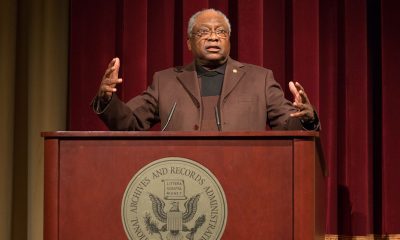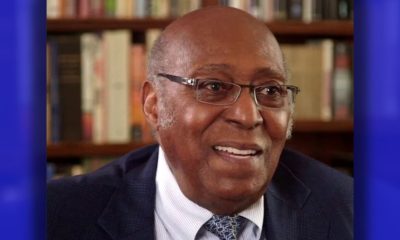Government
Gov. Shows Support For Bills Addressing Va.’s Racial Disparities
NEW JOURNAL AND GUIDE — During the 2019 session of the Virginia General Assembly, Black lawmakers and their allies proposed a number of bills to address the economic, social and educational disparities facing Virginia’s African-American community. The members of the Virginia Legislative Black Caucus have enlisted a reliable ally to make laws addressing those disparities a reality: Virginia Governor Ralph Northam.
By Leonard E. Colvin
During the 2019 session of the Virginia General Assembly, Black lawmakers and their allies proposed a number of bills to address the economic, social and educational disparities facing Virginia’s African-American community.
The members of the Virginia Legislative Black Caucus have enlisted a reliable ally to make laws addressing those disparities a reality: Virginia Governor Ralph Northam.
Seven weeks ago, most of the state’s Black and white political leaders and civil rights advocates were calling for Northam’s resignation after images surfaced on his 1985 EVMS yearbook page of one white student in Blackface and another clad in a KKK costume.
He rejected calls for him to step down. And, unable to run for another term, Northam declared he would use his tenure to address issues of racial and economic disparities in the state’s racial legacy since slavery.
“I am going to do everything to really bring some good from these events which happened six weeks ago,” he said. “Actions speak louder than words.”
To that end, the Governor recently signed a number of bills introduced by members of the Black Caucus which will take effect July 1.
Among them, Northam signed a bill sponsored by Delegate Lamont Bagby, (Democrat-Henrico County) which will create the Virginia African American Advisory Board.
The board will be composed of 21 non-legislative citizen members appointed by the Governor, and at least 15 of the members must be African American.
The Secretaries of the Commonwealth, Commerce, and Trade, Education, Health and Human Resources, and Public Safety and Homeland Security will also serve on the board as ex-officio members.
Bagby said the board will be up and running after July 1, the beginning of the state’s new budgetary cycle. Members will be appointed by the Governor then.
“I am pleased to sign this bill into law, and I look forward to working closely with the members of this board to advance policies and legislation to promote the economic, social, educational, and cultural wellbeing of the African American community in Virginia,” Northam said.
The Virginia African American Advisory Board is charged with advising the Governor on developing economic, professional, cultural, educational, and governmental links between the state government and the African American community. Two other existing state boards, the Virginia Latino Advisory Board and the Virginia Asian Advisory Board, also serve to advise the Governor on issues affecting their respective communities in Virginia, including education, health equity, public safety, and minority-owned businesses.
Educational Spending Law
During the 2019 legislative session, Bagby said the Black Caucus got a head start by sponsoring a bill which addressed educational spending disparities. He said that the legislature provided additional funds for school divisions with large numbers of poor and at-risk children in rural and urban areas.
“This is one of the legislative victories which is long overdue,” said Bagby. “It will be charged to look at a number of issues including criminal justice, the impact of educational issues related to public schools suspensions, healthcare, minority access to the procurement dollars, our HBCUs, housing equity and creation of small businesses.”
In signing the bill into law, Northam said, “To build a more accessible, inclusive, and equitable Commonwealth, we must ensure the voices of all Virginians are heard, particularly those from underrepresented and historically disenfranchised communities.”
Non-payment of Court Costs Law
Northam also amended the state budget recently passed by the General Assembly to eliminate the suspension of driving privileges for nonpayment of court fines and costs.
This amendment would also reinstate driving privileges for the more than 627,000 Virginians who currently have their licenses suspended.
“The practice of suspending a person’s driver’s license for nonpayment of court fines and costs is inequitable – it’s past time we end it,” the governor said.
While signing the measure, Northam said, “A driver’s license is critical to daily life, including a person’s ability to maintain a job. Eliminating a process that envelops hundreds of thousands of Virginians in a counterproductive cycle is not only fair, it’s also the right thing to do.”
Governor Northam also included funding in his budget to address potential lost revenue from reinstatement fees to the Department of Motor Vehicles and the Trauma
Center Fund. While these bills ultimately failed, the funding remained in the budget.
Several states are addressing this issue, which impacts poor African Americans and Hispanic individuals the most, according to civil rights activists, who support such measures.
“Fundamentally, this practice of suspending one’s driver’s license without knowing their ability to pay and undermining the ability to potentially pay court costs in the future is cruel; and, it may even be unconstitutional,” said Delegate Cliff Hayes of Chesapeake. “Virginia knows better than to have such a practice. It’s time that we do better.”
Absentee Ballot Law
With his colleagues in the House, District 5 State Senator Lionell Spruill of Chesapeake and Norfolk, saw his legislation passed to abolish the policy where Virginians must give an excuse to vote using absentee ballot.
To avoid having it killed by a GOP-led committee, Spruill said he and its sponsors made a deal with the GOP lawmakers to have the bill not take effect until 2020, just in time to bolster voter turnout for the presidential elections.
Today, if a voter is to qualify to use an absentee ballot prior to election day, he or she has to give one of 17 reasons ,including doing business out of town.
But the bill passed in the House and Senate would do away with this policy.
Senator Spruill said this legislation is a “good start” until lawmakers can pass a law allowing people to vote at will prior to an election.
Lottery Winnings and Labor Laws
There have been no instances where a Virginian has won $10 million via the state or national lotteries.
But Spruill was among sponsors of a new law which will allow residents who win that much money through the lottery to remaining anonymous.
According to state law, people who shined shoes, were baby sitters, and/or kitchen aides did not qualify to be paid the state minimum wage.
Most of these people who held such jobs during the days of Jim Crow were African Americans who were targeted by the rule. Now according to Spruill, that policy has been abolished.
The few remaining shoe shiners must be paid the $7.25 state minimum wage.
Evictions Reduction Law
Northam signed one of State Senator Mamie Locke’s signature bills which would create a pilot program aimed at reducing eviction rates in Virginia.
The legislation is designed to reverse findings by a Princeton University research group which found that five cities, including Norfolk and Newport News in Virginia, have some of the highest eviction rates in the country.`
A pilot program will be launched next year in Richmond, Danville, Hampton, and Petersburg to reduce evictions in those cities. The law calls for the collection of data on the program’s effectiveness to help develop methods for preventing evictions around the state.
Managed by the city’s court system, tenants who meet certain criteria will be able to enter into a payment plan with their landlords to avoid a judgment of eviction.
Northam signed a package of bills aimed at reducing evictions by giving tenants more time to pay rent and fees ahead of an eviction notice and limiting the number of legal actions a landlord may file.
This article originally appeared in the New Journal and Guide.
Alameda County
DA Pamela Price Stands by Mom Who Lost Son to Gun Violence in Oakland
Last week, The Post published a photo showing Alameda County District Attorney Pamela Price with Carol Jones, whose son, Patrick DeMarco Scott, was gunned down by an unknown assailant in 2018.

Publisher’s note: Last week, The Post published a photo showing Alameda County District Attorney Pamela Price with Carol Jones, whose son, Patrick DeMarco Scott, was gunned down by an unknown assailant in 2018. The photo was too small for readers to see where the women were and what they were doing. Here we show Price and Jones as they complete a walk in memory of Scott. For more information and to contribute, please contact Carol Jones at 510-978-5517 at morefoundation.help@gmail.com. Courtesy photo.
Bay Area
MAYOR BREED ANNOUNCES $53 MILLION FEDERAL GRANT FOR SAN FRANCISCO’S HOMELESS PROGRAMS
San Francisco, CA – Mayor London N. Breed today announced that the U.S. Department of Housing and Urban Development (HUD) has awarded the city a $53.7 million grant to support efforts to renew and expand critical services and housing for people experiencing homelessness in San Francisco.

FOR IMMEDIATE RELEASE:
Wednesday, January 31, 2024
Contact: Mayor’s Office of Communications, mayorspressoffice@sfgov.org
***PRESS RELEASE***
MAYOR BREED ANNOUNCES $53 MILLION FEDERAL GRANT FOR SAN FRANCISCO’S HOMELESS PROGRAMS
HUD’s Continuum of Care grant will support the City’s range of critical services and programs, including permanent supportive housing, rapid re-housing, and improved access to housing for survivors of domestic violence
San Francisco, CA – Mayor London N. Breed today announced that the U.S. Department of Housing and Urban Development (HUD) has awarded the city a $53.7 million grant to support efforts to renew and expand critical services and housing for people experiencing homelessness in San Francisco.
HUD’s Continuum of Care (CoC) program is designed to support local programs with the goal of ending homelessness for individuals, families, and Transitional Age Youth.
This funding supports the city’s ongoing efforts that have helped more than 15,000 people exit homelessness since 2018 through City programs including direct housing placements and relocation assistance. During that time San Francisco has also increased housing slots by 50%. San Francisco has the most permanent supportive housing of any county in the Bay Area, and the second most slots per capita than any city in the country.
“In San Francisco, we have worked aggressively to increase housing, shelter, and services for people experiencing homelessness, and we are building on these efforts every day,” said Mayor London Breed. “Every day our encampment outreach workers are going out to bring people indoors and our City workers are connecting people to housing and shelter. This support from the federal government is critical and will allow us to serve people in need and address encampments in our neighborhoods.”
The funding towards supporting the renewal projects in San Francisco include financial support for a mix of permanent supportive housing, rapid re-housing, and transitional housing projects. In addition, the CoC award will support Coordinated Entry projects to centralize the City’s various efforts to address homelessness. This includes $2.1 million in funding for the Coordinated Entry system to improve access to housing for youth and survivors of domestic violence.
“This is a good day for San Francisco,” said Shireen McSpadden, executive director of the Department of Homelessness and Supportive Housing. “HUD’s Continuum of Care funding provides vital resources to a diversity of programs and projects that have helped people to stabilize in our community. This funding is a testament to our work and the work of our nonprofit partners.”
The 2024 Continuum of Care Renewal Awards Include:
- $42.2 million for 29 renewal PSH projects that serve chronically homeless, veterans, and youth
- $318,000 for one new PSH project, which will provide 98 affordable homes for low-income seniors in the Richmond District
- $445,00 for one Transitional Housing (TH) project serving youth
- $6.4 million dedicated to four Rapid Rehousing (RRH) projects that serve families, youth, and survivors of domestic violence
- $750,00 for two Homeless Management Information System (HMIS) projects
- $2.1 million for three Coordinated Entry projects that serve families, youth, chronically homeless, and survivors of domestic violence
In addition, the 2023 CoC Planning Grant, now increased to $1,500,000 from $1,250,000, was also approved. Planning grants are submitted non-competitively and may be used to carry out the duties of operating a CoC, such as system evaluation and planning, monitoring, project and system performance improvement, providing trainings, partner collaborations, and conducting the PIT Count.
“We are very appreciative of HUD’s support in fulfilling our funding request for these critically important projects for San Francisco that help so many people trying to exit homelessness,” said Del Seymour, co-chair of the Local Homeless Coordinating Board. “This funding will make a real difference to people seeking services and support in their journey out of homelessness.”
In comparison to last year’s competition, this represents a $770,000 increase in funding, due to a new PSH project that was funded, an increase in some unit type Fair Market Rents (FMRs) and the larger CoC Planning Grant. In a year where more projects had to compete nationally against other communities, this represents a significant increase.
Nationally, HUD awarded nearly $3.16 billion for over 7,000 local homeless housing and service programs including new projects and renewals across the United States.
Business
Black Business Summit Focuses on Equity, Access and Data
The California African American Chamber of Commerce hosted its second annual “State of the California African American Economy Summit,” with the aim of bolstering Black economic influence through education and fellowship. Held Jan. 24 to Jan. 25 at the Westin Los Angeles Airport Hotel, the convention brought together some of the most influential Black business leaders, policy makers and economic thinkers in the state. The discussions focused on a wide range of economic topics pertinent to California’s African American business community, including policy, government contracts, and equity, and more.

By Solomon O. Smith, California Black Media
The California African American Chamber of Commerce hosted its second annual “State of the California African American Economy Summit,” with the aim of bolstering Black economic influence through education and fellowship.
Held Jan. 24 to Jan. 25 at the Westin Los Angeles Airport Hotel, the convention brought together some of the most influential Black business leaders, policy makers and economic thinkers in the state. The discussions focused on a wide range of economic topics pertinent to California’s African American business community, including policy, government contracts, and equity, and more.
Toks Omishakin, Secretary of the California State Transportation Agency (CALSTA) was a guest at the event. He told attendees about his department’s efforts to increase access for Black business owners.
“One thing I’m taking away from this for sure is we’re going to have to do a better job of connecting through your chambers of all these opportunities of billions of dollars that are coming down the pike. I’m honestly disappointed that people don’t know, so we’ll do better,” said Omishakin.
Lueathel Seawood, the president of the African American Chamber of Commerce of San Joaquin County, expressed frustration with obtaining federal contracts for small businesses, and completing the process. She observed that once a small business was certified as DBE, a Disadvantaged Business Enterprises, there was little help getting to the next step.
Omishakin admitted there is more work to be done to help them complete the process and include them in upcoming projects. However, the high-speed rail system expansion by the California High-Speed Rail Authority has set a goal of 30% participation from small businesses — only 10 percent is set aside for DBE.
The importance of Diversity, Equity and Inclusion (DEI) in economics was reinforced during the “State of the California Economy” talk led by author and economist Julianne Malveaux, and Anthony Asadullah Samad, Executive Director of the Mervyn Dymally African American Political and Economic Institute (MDAAPEI) at California State University, Dominguez Hills.
Assaults on DEI disproportionately affect women of color and Black women, according to Malveaux. When asked what role the loss of DEI might serve in economics, she suggested a more sinister purpose.
“The genesis of all this is anti-blackness. So, your question about how this fits into the economy is economic exclusion, that essentially has been promoted as public policy,” said Malveaux.
The most anticipated speaker at the event was Janice Bryant Howroyd known affectionately to her peers as “JBH.” She is one of the first Black women to run and own a multi-billion-dollar company. Her company ActOne Group, is one of the largest, and most recognized, hiring, staffing and human resources firms in the world. She is the author of “Acting Up” and has a profile on Forbes.
Chairman of the board of directors of the California African American Chamber of Commerce, Timothy Alan Simon, a lawyer and the first Black Appointments Secretary in the Office of the Governor of California, moderated. They discussed the state of Black entrepreneurship in the country and Howroyd gave advice to other business owners.
“We look to inspire and educate,” said Howroyd. “Inspiration is great but when I’ve got people’s attention, I want to teach them something.”
-

 Activism4 weeks ago
Activism4 weeks agoOakland Post: Week of March 27 – April 2, 2024
-

 #NNPA BlackPress4 weeks ago
#NNPA BlackPress4 weeks agoCOMMENTARY: D.C. Crime Bill Fails to Address Root Causes of Violence and Incarceration
-

 #NNPA BlackPress4 weeks ago
#NNPA BlackPress4 weeks agoMayor, City Council President React to May 31 Closing of Birmingham-Southern College
-

 #NNPA BlackPress4 weeks ago
#NNPA BlackPress4 weeks agoBeloved Actor and Activist Louis Cameron Gossett Jr. Dies at 87
-

 Community1 week ago
Community1 week agoFinancial Assistance Bill for Descendants of Enslaved Persons to Help Them Purchase, Own, or Maintain a Home
-

 Activism3 weeks ago
Activism3 weeks agoOakland Post: Week of April 3 – 6, 2024
-

 Business1 week ago
Business1 week agoV.P. Kamala Harris: Americans With Criminal Records Will Soon Be Eligible for SBA Loans
-

 Activism2 weeks ago
Activism2 weeks agoOakland Post: Week of April 10 – 16, 2024
























































